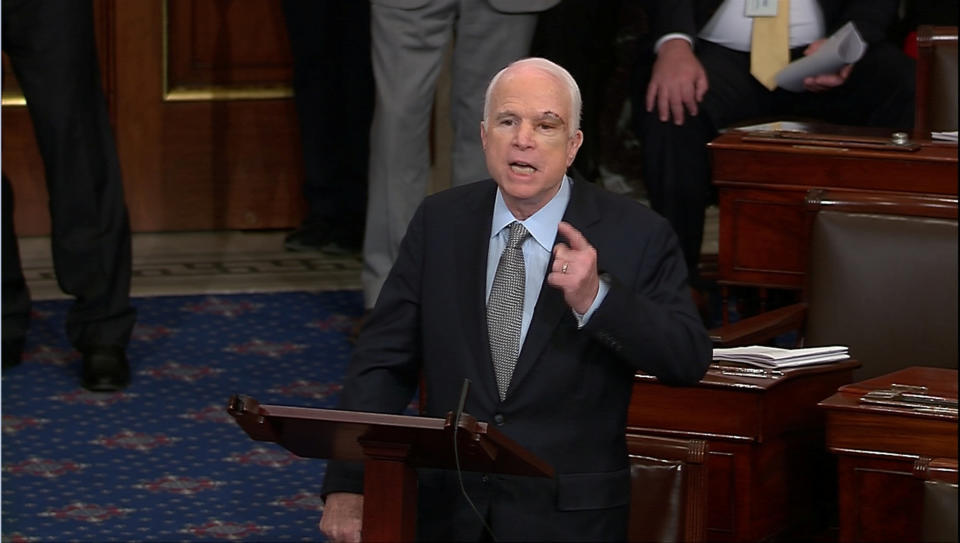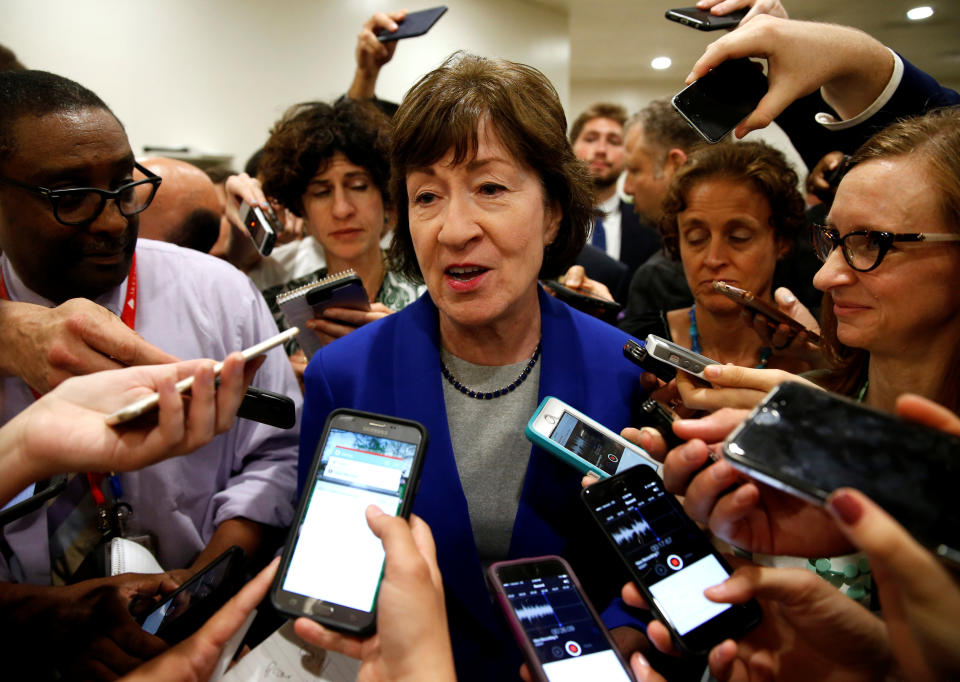Obamacare Repeal Depends On 3 GOP Senators Breaking Their Word
The fate of health care for millions of Americans appears to rest on the shoulders of a trio of Republican senators who split with their party and voted to block Obamacare repeal two months ago. Based on their own words then and now, a yes vote from any of them on the latest Senate GOP health care bill would be a stunning reversal.
Republican Sens. Susan Collins of Maine, John McCain of Arizona and Lisa Murkowski of Alaska, who all have supported repealing the Affordable Care Act in the past, shocked their colleagues and President Donald Trump by casting the deciding votes against Senate Majority Leader Mitch McConnell’s vehicle to undo the law in July. McCain’s opposition was especially remarkable, coming just days after returning to the Senate following a brain cancer diagnosis to vote in favor of a procedural motion that was supposed to set the stage for McConnell’s bill to be passed.
Now all three of those senators are in the sights of McConnell (R-Ky.), Trump and the two lead sponsors of the newest GOP health care legislation, Sens. Bill Cassidy of Louisiana and Lindsey Graham of South Carolina.
McCain and Murkowski are seen by fellow Republicans as more likely to change positions ahead of the Sept. 30 deadline for the Senate to advance repeal on a simple majority vote (budget rules enabling Republicans to avoid a Democratic filibuster that would require 60 votes to overcome expire at the end of the month). With just 52 Republicans in the Senate, McConnell can afford to lose only two votes. Sen. Rand Paul (R-Ky.) has declared he won’t support the bill, which he calls “Obamacare Lite.”
But for Collins, McCain or Murkowski to back the Cassidy-Graham bill now would mean ignoring virtually everything each senator has said about the substance of the various repeal proposals and the hasty, secretive process being used to move them ahead.
McCain delivered a dramatic speech on the Senate floor two days before the last bill failed, exhorting his colleagues to collaborate on legislating, not force through a major bill with little debate and no input from Democrats. McCain also has expressed concerns about how cuts to federal health care programs would affect his home state.
Collins and Murkowski also have bemoaned the hurried pace of Affordable Care Act repeal, especially this time around, mere days after the Cassidy-Graham legislation became public, and have more forcefully decried how that bill and previous measures would affect Medicaid and other federal health benefits, and weaken protections for people with pre-existing conditions. Both senators also object to defunding Planned Parenthood, which all the repeal bills would do.
Then and now, all three senators have been consistent and clear about their misgivings. And nothing has changed.
Cassidy-Graham is hurtling toward a vote next week with little public debate. The nonpartisan Congressional Budget Office announced it won’t have time to provide senators with a full analysis of the legislation, including how it will affect health coverage and health insurance prices.
No Senate committee has held a hearing on the bill, and the Finance Committee hearing scheduled for Monday will take place just days before senators will be asked to vote ― which is long past the point at which such a hearing would actually be useful as a way to alter and improve the legislation.
Like the previous Senate repeal measures and the bill that passed the House in May, Cassidy-Graham eliminates the Affordable Care Act’s Medicaid expansion, radically reshapes the overall Medicaid program and severely reduces the federal commitment to programs aiding low-income and middle-class households.
The bill also would enable states to undercut the Affordable Care Act’s guarantee of coverage regardless of pre-existing conditions by allowing insurers to go back to charging higher rates based on a person’s health status and leaving out vital benefits, such as prescription drugs.
Here is a compilation of remarks McCain, Collins and Murkowski have made about Obamacare repeal since this summer. A vote for Cassidy-Graham would be wholly incompatible with any of these statements.
John McCain

McCain is NOT ready to back this bill: "I want the regular order"
— Burgess Everett (@burgessev) September 20, 2017
“Nothing has changed. If McConnell wants to put it on the floor, that’s up to McConnell.... I am the same as I was before. I want the regular order.”
“I’m not interested in only having an up-or-down vote on what’s one-fifth of the gross national product.... There was nine months left when we first came to Congress. I’m not the one that waited nine months to bring up an issue, and we just went through that last fiasco. It’s not my problem we only have those few days left…. I’m for the regular order. I want to have amendments. I want others to have amendments. I want debates…. We’re supposed to jam it through?”
[HuffPost interview, Sept. 19]
“We just went through that last fiasco. It’s not my problem that we only have those few days left. What were we doing the last nine months?”
“It’s not so much 60 votes that I care about. It’s a bipartisan approach to the issue — that’s what I mostly care about.”
“I have talked and talked and talked about the need to do regular order. I have amendments that I would like to have votes on.... Am I going to be able to have those, or is [it] going to be an up-or-down vote? That’s not why I came to the Senate, just to give up-or-down votes…. Do we want to do the same thing we did with Obamacare, and that is jam it through on party lines where it will then not have any bipartisanship and perhaps meet the same fate that Obamacare did?”
“We must now return to the correct way of legislating and send the bill back to committee, hold hearings, receive input from both sides of the aisle, heed the recommendations of the nation’s governors, and produce a bill that finally delivers affordable health care for the American people. We must do the hard work our citizens expect of us and deserve.”
“We’ve tried to do this by coming up with a proposal behind closed doors in consultation with the administration, then springing it on skeptical members, trying to convince them it’s better than nothing, asking us to swallow our doubts and force it past a unified opposition. I don’t think that is going to work in the end. And it probably shouldn’t…. Why don’t we try the old way of legislating in the Senate, the way our rules and customs encourage us to act. If this process ends in failure, which seems likely, then let’s return to regular order…. [H]old hearings, try to report a bill out of committee with contributions from both sides. Then bring it to the floor for amendment and debate, and see if we can pass something that will be imperfect, full of compromises, and not very pleasing to implacable partisans on either side, but that might provide workable solutions to problems Americans are struggling with today.”
Susan Collins

"Lack of hearings, an incomplete CBO score, very limited debate..." -- Susan Collins to reporters, clearly coming around on Cassidy-Graham.
— Jennifer Bendery (@jbendery) September 19, 2017
“I have a lot of concerns about the bill. From the initial analysis that I’ve done, it would mean a billion dollars less for the state of Maine for Medicaid and other federal health care spending…. You really jeopardize the very existence of those hospitals, particularly in rural Maine but throughout our state. I’m also concerned that the bill does not afford automatic protections to people with pre-existing conditions. They would be sold insurance, but that insurance might well be unaffordable…. It would be helpful to have the CBO ― the Congressional Budget Office ― analysis, which would tell us the impact on premiums, the impact on coverage, the impact on consumer protections like those for pre-existing conditions, the impact on the requirement for coverage of people with substance abuse ... . So I’d like to have all of that data. And that’s one of the problems. This bill did not go through the committee process. it makes fundamental changes in Medicaid despite not having a single hearing on that part.”
“I’m concerned about what the effect would be on coverage, on Medicaid spending in my state. On the fundamental changes in Medicaid that would be made without the Senate holding a single hearing ... and also what the effect would be on premiums.”
Love HuffPost? Become a founding member of HuffPost Plus today.
“Earlier this week I voted against proceeding to health care reform legislation ― the American Health Care Act of 2017 ― that passed the House of Representatives last May without a single Democratic vote. For many Americans, this bill could actually make the situation worse. Among other things, the bill would make sweeping changes to the Medicaid program ― an important safety net that for more than 50 years has helped poor and disabled individuals, including children and low-income seniors, receive health care. The non-partisan Congressional Budget Office (CBO) projects that the number of uninsured Americans would climb by 23 million under this bill…. If Planned Parenthood were defunded, other family planning clinics in Maine, including community health centers, would see a 63 percent increase in their patient load. Some patients would need to drive greater distances to receive care, while others would have to wait longer for an appointment.”
“I have deep concerns and am opposed to the Senate bill … [that] would take out of the Medicaid program more than $700 billion … . You don’t take a safety net program that has been operating for more than 50 years and change it in fundamental ways without having a single hearing to evaluate its impact.”
Lisa Murkowski

Colleague Jason Donner rpts Murkowski just finished mtg Graham/Cassidy in Sullivan's office. Ready to back health care bill? "Nope, I'm not"
— Chad Pergram (@ChadPergram) September 20, 2017
.@lisamurkowski on how she cld consider voting for health care after getting a great reception in Alaska after voting against it last time pic.twitter.com/23ospphz8U
— Leigh Ann Caldwell (@LACaldwellDC) September 19, 2017
“In fairness to my governor, in fairness to Alaskans, the numbers actually matter and so if it can be shown that Alaska is not going to be disadvantaged, we gain additional flexibility, then I can go back to Alaskans and I can say, ‘OK, let’s walk through this together.’”
“I have said pretty consistently that process really does matter, particularly when you’re dealing with something that is as direct and personal as health care, something that has an impact on one-sixth of the nation’s economy.”
[Alaska Dispatch News, July 26]
“I have repeatedly said that health care reform, and especially major entitlement reform, should go through the committee process where stakeholders can weigh in and ideas can be vetted in a bipartisan forum…. I voted ‘no’ today to give the Senate another chance to take this to the committee process.”
“I am committed to ensuring that important provisions of the ACA, such as covering those with pre-existing conditions, continued support for Medicaid expansion, coverage for dependents and no lifetime limits, and funding for Planned Parenthood remain intact.”
J.M. Rieger and Matt Fuller contributed reporting.
Also on HuffPost
Melania and I send our thoughts and prayers to Senator McCain, Cindy, and their entire family. pic.twitter.com/SO4XYgnyug
— President Trump (@POTUS) July 20, 2017
John McCain is an American hero & one of the bravest fighters I've ever known. Cancer doesn't know what it's up against. Give it hell, John.
— Barack Obama (@BarackObama) July 20, 2017
John and I have been friends for 40 years. He's gotten through so much difficulty with so much grace. He is strong - and he will beat this.
— Joe Biden (@JoeBiden) July 20, 2017
John McCain is as tough as they come. Thinking of John, Cindy, their wonderful children, & their whole family tonight.
— Hillary Clinton (@HillaryClinton) July 20, 2017
.@SenJohnMcCain is a hero to our Conference and a hero to our country. pic.twitter.com/Ld2lQH1mMn
— Leader McConnell (@SenateMajLdr) July 20, 2017
.@SenJohnMcCain has always been a warrior. It's who he is. All of us, not as Republicans or Democrats, but as Americans, are behind him. pic.twitter.com/B6iDpPultM
— Paul Ryan (@SpeakerRyan) July 20, 2017
.@SenJohnMcCain is a hero, a patriot and a fighter. I am privileged to call him a friend. Paul & I pray for his recovery and his family.
— Nancy Pelosi (@NancyPelosi) July 20, 2017
As he’s shown his entire life, don’t bet against John McCain. Best wishes to him for a swift recovery.
— Bill Clinton (@billclinton) July 20, 2017
Following is a statement by @GeorgeHWBush on @SenJohnMcCain. pic.twitter.com/x8kIStWz7p
— Jim McGrath (@jgm41) July 20, 2017
Hang in there @SenJohnMcCain. You're tough! You can beat this. Fight, fight, fight! I am proud to call you my friend.
— Gabrielle Giffords (@GabbyGiffords) July 20, 2017
To say @SenJohnMcCain is a fighter is an understatement. Time and time again, he has shown all of us how to be courageous under fire.
— Sen. Heidi Heitkamp (@SenatorHeitkamp) July 20, 2017
Counting on the legendary John McCain strength to give cancer its toughest fight ever. Rooting for you, dear friend.
— Ron Wyden (@RonWyden) July 20, 2017
Hey John! We can't wait to welcome you to the club. You got this! ❤️@SenJohnMcCain #cancersurvivors
— Claire McCaskill (@clairecmc) July 20, 2017
I love @SenJohnMcCain. Unbeatable, unbreakable. He's Teddy Roosevelt's "man in the arena" even when we're on opposite sides. God bless. pic.twitter.com/0sBY4QynWp
— John Kerry (@JohnKerry) July 20, 2017
This article originally appeared on HuffPost.

